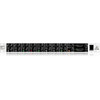Behringer EURORACK PRO RX1602 Manual - Page 6
Main
 |
View all Behringer EURORACK PRO RX1602 manuals
Add to My Manuals
Save this manual to your list of manuals |
Page 6 highlights
6 EURORACK PRO RX1602 User Manual (2) By using the BALANCE control, you can • set up the position of mono signals in the stereo image, and • regulate the ratio of left/right channel signals when processing stereo signals (3) The MUTE switch is used to interrupt the signal path, thus muting the respective channel. When pressed (signal muted) the switch is lit red. When the MUTE switch is not depressed, the red light functions as CLIP display, indicating when the input signal level is too high (>+17 dBu). To avoid distortion, please reduce the signal level using the LEVEL control (4) in case the CLIP indicator is frequently or permanently lit. (4) To increase or reduce the input signal level, use the LEVEL control (increase up to +15 dB, reduce all the way down to -oo). Similarly, use the LEVEL controls of the channel sections to regulate the channel's signal level present in the main mix. (5) Use the OPERATING LEVEL switch located on the rear of your RX1602 to individually adjust each channel to the output signal level of your equipment. When the switch is depressed (-10 dBV), the inputs are more sensitive. (6) These are the inputs of the channel sections on balanced 1/4" TRS connectors. Of course, you can connect mono jacks (unbalanced operation). To use a channel for a mono signal, please connect the signal source to the left input. 2.2 Main section (7) (8) (9) Gain setting: To correctly set the input gain of a channel, please press the MUTE switch (3) of the remaining channels. When recording with digital multi-channel recorders, the peak meter on the recorder should not reach over 0 dB. This is because unlike with digital recordings, even the smallest amount of distortion can lead to unpleasant-sounding end result. With analog recorders, the VU meters of the recording device should read roughly up to +3 dB in case of low-frequency signals (e.g. bass drum). Because of their inherent inertia, VU meters tend to display levels of signals with frequencies of above 1 kHz too low. Therefore, when using instruments such as a hi-hat, you should set the input gain only up to -10 dB. Snare drums should be set up to roughly 0 dB. ◊ The peak meters of your EURORACK PRO display the level virtually frequency-independent. A re-cording level of 0 dB is recommended for all kinds of signals. (10) The TO PHONES switch gives you the option to feed the signals routed to the monitor/effects bus into your headphones for control purposes. Attention! ◊ We would like to bring your attention to the fact that high volume levels may damage your hearing and/or your headphones. Please turn the MAIN LEFT and MAIN RIGHT controls as well as the PHONES control in the main section all the way to the left before powering up the unit. Please always pay keen attention to an appropriate volume level. (11) The LEVEL control in the MAIN section governs the volume level of your headphones. Please connect your headphones to the PHONES connector. It is a standard 1/4" TRS stereo connector. (11) (3) Fig. 2.2: Main section (7) Use the MON/FX SEND control to set the signal level of those signals that are routed to the MON OUT SEND connector (14) for monitoring or effects applications. (8) The left signal portion of the mix created using the LEVEL and BALANCE controls of each channel is set using the MAIN LEFT control. The right signal portion of the mix is correspondingly adjusted using the MAIN RIGHT control. Amplification of up to +15 dB is possible on both controls. (9) You can easily get a readout of both channels by observing the highly acurate 7-digit level meters labeled LEFT OUTPUT LEVEL and RIGHT OUTPUT LEVEL. (12) Fig. 2.3: POWER switch, LEVEL control and PHONES connector (12) Use the POWER switch to power up your RX1602. The POWER switch should always be in the "Off" position when you are about to connect your unit to the mains. ◊ Attention: The POWER switch does not fully disconnect the unit from the mains. Unplug the power cord completely when the unit is not used for prolonged periods of time.















